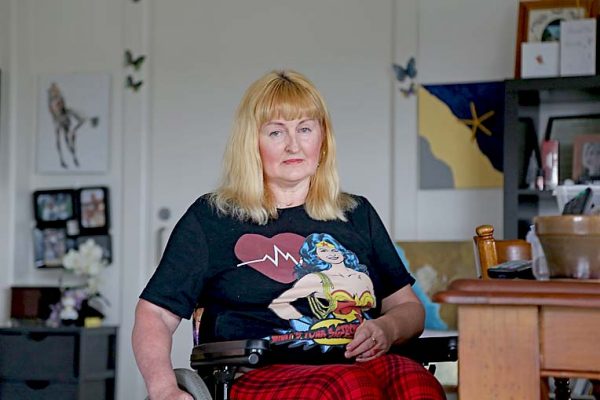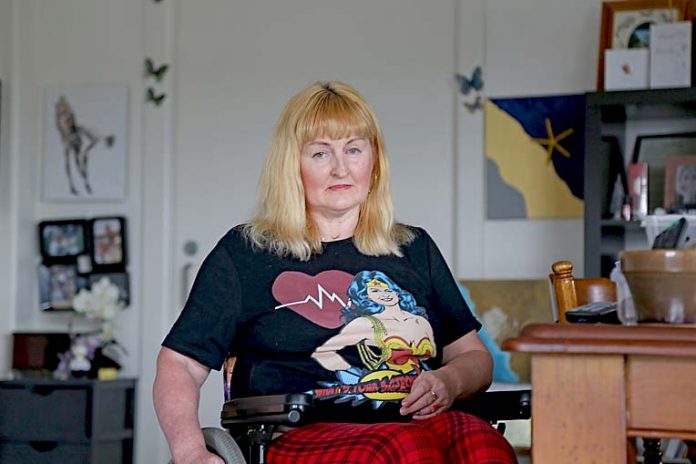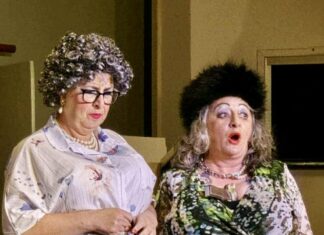
LIFE can change in a split second, ask Amanda Ferguson.
The much-loved, former Millicent North Primary School teacher’s world was turned upside down by a “one-second” event eight years ago.
This event marked the start of a lifelong journey, which she describes as “the speed bump from hell”.
Today, Ms Ferguson remembers September 3 as the day she survived a brain stem stroke – a life threatening medical condition which causes impairments to vital body functions.
Winding back the clock to the night before the life-changing ordeal, Ms Ferguson recalls having a pounding headache that could not be alleviated by medication.
Despite her headache, she went about her normal school routine in the classroom with her students.
But the normality of the day did not prepare her for the chain of events that was to follow.
“I remember feeling dizzy, collapsing and the circuitry in my brain going haywire,” she said.
“I laid on the ground trying to move, but nothing would work.
“My body was not doing what it should do.”
Ms Ferguson was rushed to the Millicent and District Hospital.
However, uncertainty still surrounded the cause of the problem and the Royal Flying Doctor Service was urgently contacted.
Due to bad weather, she could not be flown to Adelaide until the following morning.
“I thought it was a stroke, but the doctors said I was too young,” she said.
“With stroke, time is of the essence and waiting to be flown out the next morning meant more damage to my fragile brain.”
Ms Ferguson’s biggest fears were confirmed when she was admitted to Flinders Hospital’s stroke ward – a place which she would soon call home.
She said when she finally woke from her nightmare she felt like she had been “buried alive”.
“I knew my body was with me, but I was no longer in charge – humorous if you know how much of a control freak I am.”
As a result of the stroke Ms Ferguson suffered from “locked-in syndrome”, a medical condition in which the body and most of the facial muscles are paralysed.
Locked-in syndrome meant she could see, hear and smell but was not able to interact with the world around her.
Her only forms of communication were to cry, blink or stare.
Memories from this period are foggy for Ms Ferguson.
“I did not really know what was real and what was not,” she said.
“I know when I woke up ‘properly’ it was clear to me my whole body was paralysed.”
A trachea was inserted to help Ms Ferguson breathe and she was receiving medication and fed through a tube inserted into her stomach.
For nearly four months she struggled to comprehend what had happened and plan for the road ahead.
She was determined to get better and her road to recovery began with the simple movement of a finger.
From that point on movements became more rapid and doctors were amazed at her progress, so much so she was transferred to Hampstead’s brain injury unit and the Mount Gambier Hospital for rehabilitation.
Here she spent days in various forms of therapy, including physio, speech and hydro.
“I recall meeting amazing people in rehab,” she said.
“Accident victims, one punch survivors and of course other stroke survivors.
“We did not want to be called victims because we had made it this far instead of dying.”
When Ms Ferguson was strong enough she was moved into a unit on Wireless Road, Mount Gambier.
“They would not let me leave until I could put myself to bed, shower and dress independently,” she said.
“I’m pretty independent, but I do get 35 hours of care a week from Homecare, which also runs the units.”
The unit, which Ms Ferguson calls home, is facilitated for wheelchair users, enabling the stroke survivor to keep her independence.
Since moving in she was grateful for “a second shot at life” although it is very different to the one she had known before.
While her stroke has claimed many things, including her job, family, driver’s licence and ability to walk, she still remains optimistic.
“I do have some control, but I am still focused on regaining skills and making progress,” she said.
“I still miss my previous life.
“It seems pretty tragic, but I have to look at the positives and there are many.
“My abilities may have shrunk, but my world is much larger.
“Before that day I was focused on my own life and personal trials that felt so very important to me.
“Since that day, I have been able to focus on what I like to do.
“Most people spend their whole life working to pay bills, worried about what others think and concerned about small speed humps.
“I now know that life can change in a split second – it’s too short.
“I do not sweat the small stuff and I eat that cake if I want to.”








